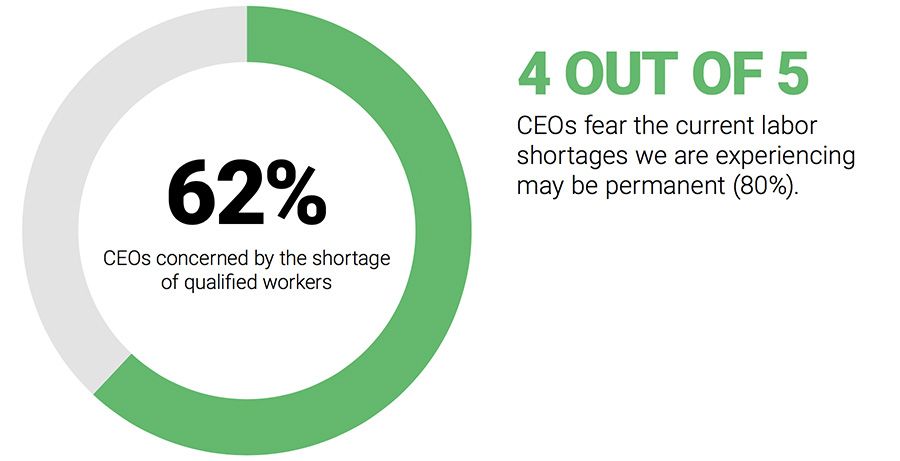Global management consultancy AlixPartners has surveyed more than 3,000 CEOs and executive globally to gain insights in the key trends and priorities in the boardroom. The report concludes that business disruption across the business landscape has reached unprecedented heights, with four major forces that will longer term transform the world economy.
Demographic decline
For large parts of the world, the decade of the 2020s marks a stark transition: It is the first decade in which all of the leading economies across the globe – Europe, the US, Japan, and China – will see labor force growth markedly slow and, in many cases, shrink.
Retirements will outpace new workforce entrants in almost every major economy. Indeed, only India, Africa and parts of the Middle East will see meaningful labor force growth in this decade. This will present a major economic tailwind: Fully a third of GDP gains over the last six decades have come directly from labor force growth.

of the CEOs surveyed, four in five (80%) told AlixPartners they fear the current labor shortages may be permanent.
Technological acceleration
The explosion in new technologies is both a boon and a bane – technological innovation will become the principal driver of economic growth and promises to improve our lives and our world, but it is also the primary source of disruption and dislocation.
This is the tsunami wave that has executives most worried. The 2020s are seeing the emergence of the so-called bionic enterprise: the merging of human capital with artificial intelligence, big data, robotics, and an array of digital technologies to drive nextorder business outcomes. The mission for companies is clear: Be digital or die.

Climate transition
The effects and urgency of climate change have become increasingly apparent and accepted. And it is not just the long-term effects, but also the growing climate volatility as we see a marked increase in extreme weather events, both devastating and costly.
As important as climate change itself is our response to it. Roughly $2 trillion annually is now being invested in new renewable energy technologies, and fully 50% of investment dollars are now tied to net zero emissions requirements. Moreover, ESG demands from a broad range of stakeholders – including customers, employees, investors, and regulators – are driving companies to set more ambitious goals.

We should expect to see a plethora of new technologies and operating models aimed to drive a more sustainable set of environmental outcomes.
Deglobalization
After nearly three decades of expansion, the forces of globalization – which have helped fuel economic growth through greater trade, exchange, and openness – are in retreat. Barriers are going up, and global trade declining. Protectionism is on the rise.
The world’s two largest economies, the US and China, appear to be on a path of continued confrontation. Actions like Brexit and punitive trade wars are making economies more isolated than not.

A long-term realignment of supply chains is underway. The biggest near-term implication will be increased economic friction, reversing more than two decades of falling prices and access to cheap goods. We should expect continued rising prices and inflation, as well as the distinct possibility of increased global conflict.
Commenting on the four mega trends, the CEO of AlixPartners Simon Freakley said: “The pandemic presented businesses and their leaders with the most acute set of disruptors since World War II. However, CEOs view these issues as paling in comparison to the demographic, technological, climate, and international trade challenges that their businesses must confront today and in the years ahead.”
Four major forces that will truly transform the global economy - Consultancy.eu
Read More
No comments:
Post a Comment